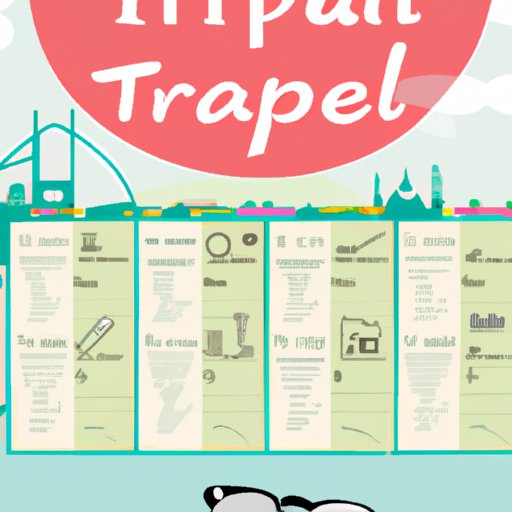Introduction
Trip planning is the process of choosing a destination, arranging transportation, booking accommodations, and scheduling activities for travelers. Professional trip planners help clients make the most of their vacation by providing personalized services, from gathering detailed information about their needs and interests to developing a comprehensive itinerary and budget. Becoming a trip planner is a great way to use your skills and knowledge to craft unique experiences for clients.

Research the Basics of Trip Planning
If you’re interested in becoming a trip planner, it’s important to understand the basics of the profession. There are two main types of trip planning services: full-service and self-service. Full-service trip planners provide comprehensive services, including researching destinations, selecting accommodations and activities, and creating an itinerary. Self-service trip planners offer more limited services, such as helping clients find deals on airfare and hotels.
To become a trip planner, you’ll need certain skills and knowledge. Good organizational skills will come in handy when you’re creating detailed itineraries and budgets. You should also be familiar with popular travel destinations, local laws and regulations, and various transportation and accommodation options. Finally, you should have a good understanding of travel insurance, currency exchange rates, and other basic concepts related to trip planning.
Create a Checklist for Necessary Planning Steps
Once you’ve researched the basics of trip planning, you should create a checklist of all the steps you need to take in order to plan a successful trip. This list should include gathering information from clients, considering their destination preferences, identifying potential travel options, and determining their budget and other needs.
You should also consider whether there are any special requirements for the trip, such as passports or visas. If the client has any medical conditions or dietary restrictions, you should make sure to factor these into your planning. Additionally, you should ask if the client has any special requests, such as a specific type of hotel or a particular activity.

Familiarize Yourself with Popular Trip Destinations
In order to provide valuable advice to your clients, you should become familiar with popular trip destinations. Research local laws and regulations, as well as lodging and transportation options. Investigate attractions and activities that may appeal to your clients. Consider visiting some of the locations yourself so that you can provide firsthand insights to your clients.
Secure Accommodations and Transportation
Once you’ve identified potential travel options, you can begin booking flights, hotels, and car rentals. Make sure to confirm all reservations and establish payment plans with clients. You should also keep track of any discounts or special offers that may be available.

Develop an Itinerary and Budget
Now it’s time to create a detailed itinerary and budget for the trip. Include all necessary information, such as flight times, hotel addresses, and attraction hours. Calculate expenses for each item and set up payment plans. You should also consider any additional costs, such as meals, tips, and souvenirs.
Plan Activities and Attractions
One of the most important parts of trip planning is selecting activities and attractions that will appeal to your clients. Research popular attractions and select activities based on their interests. Purchase tickets in advance to avoid waiting in line or paying more at the gate.
Offer Value-Added Services and Support
Finally, you should provide value-added services and support to your clients. Offer suggestions for dining and shopping, as well as advice on local customs and culture. Monitor weather and travel conditions and provide updates as needed. Be prepared to answer questions and address any issues that may arise during the trip.
Conclusion
Becoming a trip planner is a great way to use your skills and knowledge to craft unique experiences for clients. By researching the basics of trip planning, creating a checklist for necessary steps, familiarizing yourself with popular destinations, and offering value-added services, you can become a successful trip planner.
The benefits of becoming a trip planner are numerous. Not only will you get to explore new places and cultures, but you’ll also get to help others do the same. Plus, you’ll get to work on your own schedule and make a living doing something you love.
(Note: Is this article not meeting your expectations? Do you have knowledge or insights to share? Unlock new opportunities and expand your reach by joining our authors team. Click Registration to join us and share your expertise with our readers.)
